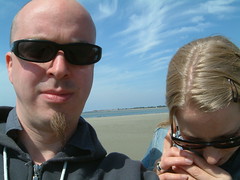 (thanks to Andrew Jones for the picture)
(thanks to Andrew Jones for the picture)I really am a bad, bad blogger. Nearly a week has gone by (a long time in the blog world) and I have yet to record my thoughts and feelings about the 24 hour get-together I went to last week at High Leigh conference centre for those involved in the 'emerging church' in the UK. It was a privilege to be there and great to connect with many friends from around the country (too numerous to link to here).
As usual with these things there's as much value in just being together - at the meals, down the pub etc. - as there is in the actual sessions, as good as those were.
We were there principally for two reasons : to have some time reacting to Ryan Bolger (and Eddie Gibbs's) book - Emerging Churches - from a UK perspective, and to talk about whether or not we needed to be more intentional as far as networking individuals and groups together is concerned.
As far as the first of these aims was concerned it was great to have Ryan Bolger present with us to talk about the book. I think it's a great book - I loved the stories etc. My concern is that the '9 marks of the emerging church' that it presents (don't have it to hand so can't list them - go look it up!) sound to me simply like authentic Christianity rather than any particularly post-modern form of Christianity! I think it was helpful to have these characteristics mentioned - on the level of practices - but I also think that if the emerging church is truly about incarnating Christian community in postmodern culture then we also need to tease out what is specifically postmodern (not simply biblical) about the way we are expressing faith together.
So, for example, I think that one of the features of churches who are intentionally seeking to exist in the postmodern context is a desire to operate beyond conservative/liberal polarities.
In other words - if the emerging church is about engaging with postmodernity what are the things that make it postmodern? I'm not sure the book answers that question although I think maybe one of the 9 points (doing away with the sacred/secular split) begins to.
As far as the other aim of the get-together is concerned there was some lively discussion about whether or not we should name an intentional network and have some more shape to what we are doing (together).
My gut feeling is that there should be some more intentionality but we don't need to name it. Let's just let it evolve naturally. I would be happy to get together again like that next year and maybe all the people who were there this year could suggest others who could be invited and it could just grow naturally and organically.
(BTW on the naming thing, some were concerned that if we don't name ourselves others will do it for us - but in the scriptures naming was always done by others).
So intentionality : yes (so thumbs up for get-togethers and gatherings) but naming and structuring it too much: no. (Unless we called it something like 'Old Wine'(which incidentally I always thought was supposed to be the best anyway!).
One last thing - I'm really looking forward to us getting beyond the self-referential stage in our get togethers i.e. getting together to talk about the 'emerging church'. Don't get me wrong - I thought last week's content was good and necessary. It's just that there is a stage beyond being very conscious of a new tool and that is incorporating the tool into yourself (almost as an extension of the body) where you become less conscious of the tool and more conscious of what you are doing with the tool.
So I look forward to more times of gathering together when we're moving beyond talking about who we are and we give more attention to what we are trying to do. My suggestion would be to have a conversation about theology (get a theologian in to spark us off) or spirituality or mission.
Anyway - sorry about the long, rambling post.
Had a great time - thanks to Jonny and Ben for organising it.





